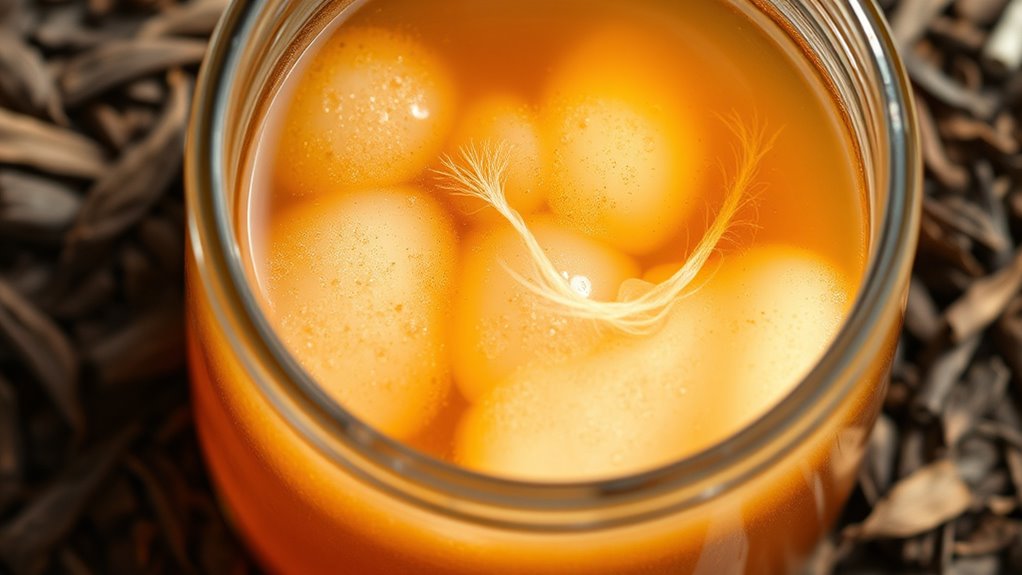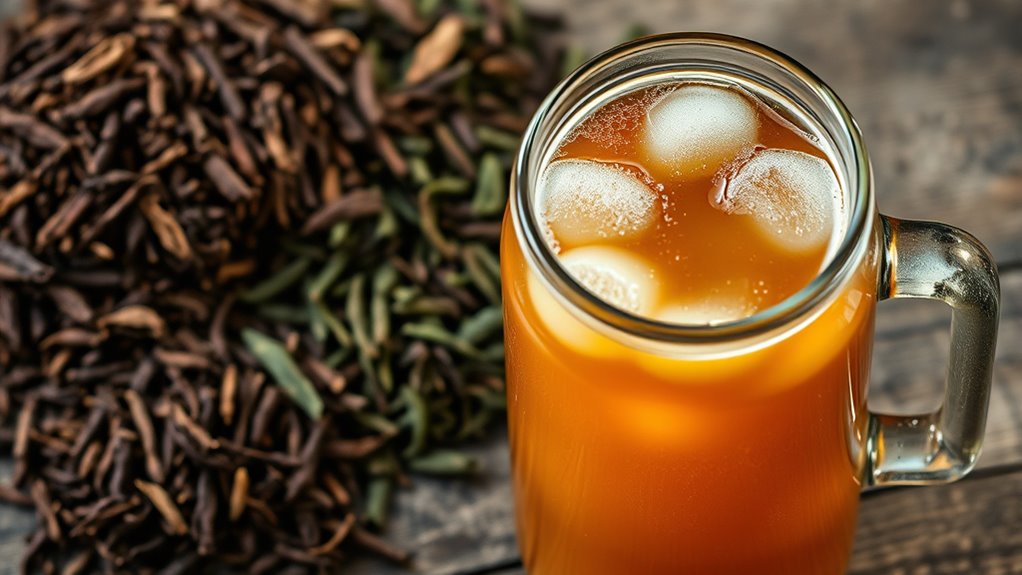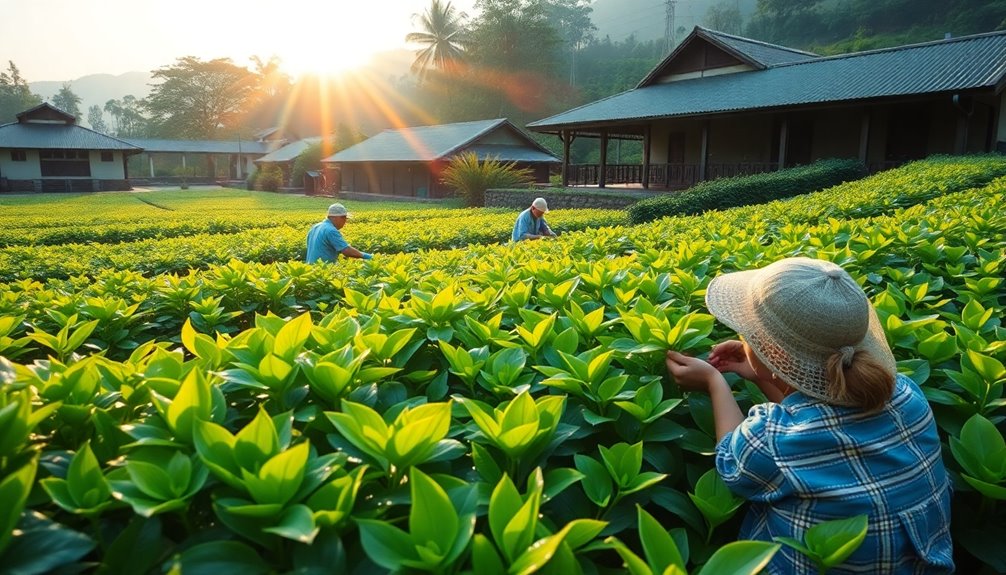Fermentation makes kombucha different from traditional teas by transforming sweetened tea with a SCOBY—a culture of bacteria and yeast—into a tangy, bubbly beverage. Yeast ferments sugars into alcohol and carbon dioxide, giving kombucha its fizz, while bacteria turn alcohol into acids, adding flavor and probiotics. Unlike steeped teas, kombucha involves fermentation, which boosts its probiotic content. To discover more about how fermentation enhances health and flavor, keep exploring this fascinating process.
Key Takeaways
- Kombucha is a fermented beverage produced by fermenting sweetened tea with a SCOBY, unlike traditional teas which are simply steeped leaves.
- During fermentation, yeast in kombucha converts sugars into alcohol and carbon dioxide, creating carbonation; bacteria produce acids for flavor.
- Traditional teas mainly provide antioxidants and caffeine, while kombucha offers probiotics that support gut health.
- Kombucha involves a natural fermentation process that enhances flavor and probiotic content, whereas traditional teas are steeped without fermentation.
- Fermentation science explains how kombucha’s unique health benefits and flavors develop, differentiating it from non-fermented traditional teas.

Have you ever wondered how foods like yogurt, sauerkraut, or kimchi develop their unique flavors? It all comes down to the fermentation process—a natural method that transforms ordinary ingredients into flavorful, probiotic-rich foods. When you think about fermentation, think of it as a biological dance where beneficial microbes break down sugars and other compounds, creating new tastes and textures. This process doesn’t just add flavor; it also liberates probiotic benefits that can boost your gut health. By consuming fermented foods, you introduce live bacteria into your digestive system, supporting digestion, immune function, and overall well-being.
Kombucha stands out from traditional teas because it’s a fermented beverage rather than just steeped leaves. While regular teas like black or green tea are made by infusing dried leaves in hot water, kombucha involves fermenting sweetened tea with a symbiotic culture of bacteria and yeast (SCOBY). During this fermentation process, the yeast ferments the sugar into alcohol and carbon dioxide, while the bacteria convert alcohol into acids. This transformation gives kombucha its characteristic tangy flavor, effervescence, and slight sweetness. It’s this fermentation that produces the probiotic benefits, making kombucha a popular choice for those seeking digestive health support.
Unlike traditional teas, which are mostly just antioxidants and caffeine, kombucha contains live cultures that can improve your gut microbiome. These probiotics help balance your intestinal flora, potentially reducing bloating, improving digestion, and even enhancing immune response. Because the fermentation process involves the growth of specific microorganisms, each batch of kombucha can have a slightly different flavor profile and probiotic content, adding to its uniqueness.
People often choose kombucha over regular teas because it offers more than just hydration or a caffeine boost; it provides a functional drink packed with beneficial microbes. While traditional teas are celebrated for their antioxidants, kombucha combines these benefits with the added advantage of probiotics, making it a dynamic addition to your diet. Understanding how fermentation transforms simple ingredients into health-promoting beverages like kombucha helps you appreciate the science behind it. It’s not just about taste—it’s about harnessing a natural process that supports your health through the power of beneficial bacteria. As you explore different fermented foods and drinks, you’ll see how fermentation process innovations bring both flavor and health benefits into your daily routine. Additionally, awareness of regulatory compliance in the production of fermented beverages ensures safety and quality standards are maintained for consumers.
Frequently Asked Questions
Can I Ferment My Own Kombucha at Home Safely?
Yes, you can ferment your own kombucha at home safely if you follow proper safety precautions. Start with clean equipment and high-quality tea and sugar. Keep your brewing environment sanitary, avoid contamination, and monitor the SCOBY regularly. Use trusted recipes and avoid shortcuts. By staying vigilant and practicing good hygiene, you can enjoy homemade kombucha without risks, making home brewing a safe and rewarding experience.
How Long Does Homemade Kombucha Typically Take to Ferment?
For your question about fermentation timeline, homemade kombucha typically takes about 7 to 14 days to ferment. During this brewing duration, you’ll notice the formation of bubbles and a tangy flavor developing. Keep in mind, the exact timing depends on factors like temperature and your taste preferences. Regularly taste your brew after the first week to determine if it’s reached the desired balance of sweetness and acidity.
Are There Health Risks Associated With Unpasteurized Kombucha?
You might wonder if unpasteurized kombucha poses health risks. It can, if bacterial contamination or mold growth occurs during fermentation. These issues can lead to illness, so it’s essential to guarantee your kombucha ferments properly in a clean environment. Always use sanitized equipment, monitor for mold, and avoid drinking if you notice any unusual smell, color, or mold. Proper care minimizes risks and keeps your kombucha safe.
What Are Common Flavors Added During Kombucha Fermentation?
You often add fruit infusions, herbal blends, and spices to kombucha during fermentation, creating a vibrant spectrum of flavors. These additions enhance sweetness, aroma, and complexity, transforming each batch into a unique experience. Whether it’s berries, citrus, ginger, or mint, you infuse your brew with natural ingredients that complement its tangy profile. This process allows you to customize your kombucha, making every sip invigorating, flavorful, and tailored to your taste.
How Does Fermentation Affect the Caffeine Content in Tea?
You might wonder how fermentation impacts caffeine levels in tea. During fermentation, microorganisms break down some tea caffeine, potentially reducing its content slightly. However, the overall fermentation process doesn’t eliminate all caffeine; it mainly alters its form, making it easier to digest for some. So, if you’re sensitive to caffeine, expect some reduction, but not complete removal, of tea caffeine during fermentation.
Conclusion
Now that you know how kombucha differs from traditional teas, you can appreciate each for what they are—refreshing, flavorful, and full of history. Whether you choose the fizzy tang of kombucha or the comforting warmth of tea, you’re embracing a world of tradition and transformation. So, sip slowly, enjoy fully, and explore both with curiosity. After all, it’s about enjoying the journey, savoring the moment, and discovering what truly refreshes you.










